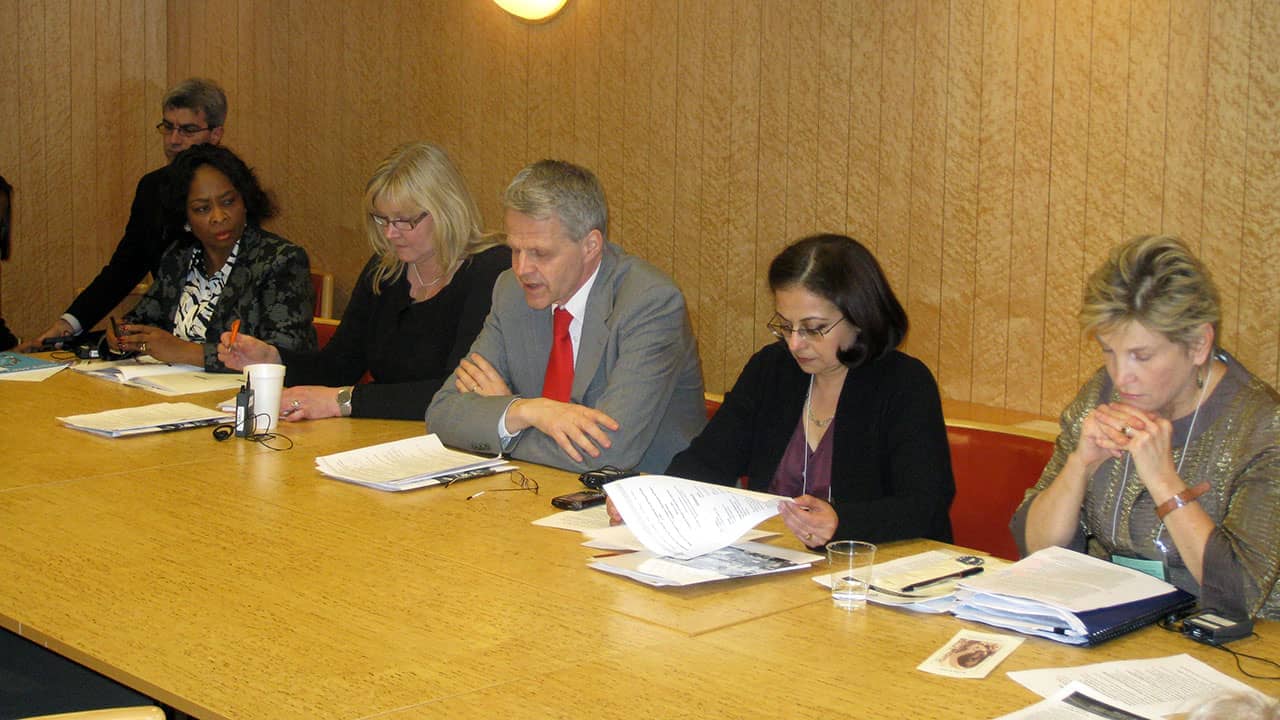
Role of Policymakers in Governance, Development and Women's Empowerment
With support from the:
Swedish International Development Cooperation Agency (Sida)
Royal Foreign Ministry of Denmark (Danida)
United Nations Population Fund (UNFPA)
PGA organized a Parallel Side Meeting in conjunction with the 54th CSW on the topic of "Role of Policymakers in Governance, Development and Women's Empowerment" on March 11, 2010 at the Permanent Mission of Sweden to the UN. The meeting was attended by Members of Parliament from Afghanistan, Albania, Democratic Republic of the Congo (DRC), Denmark, Ghana, Nigeria, Pakistan, Sierra Leone, South Africa, Suriname, Sweden, Turkey, Uganda and Zambia. There were also representatives from UNIFEM, Permanent Missions and the International Disabilities Alliance (IDA). The aim of the meeting was to generate a discussion on various issues related to women's empowerment and also lay an initial foundation for further topics for the upcoming 32nd Annual Forum on Women's Empowerment.
The meeting opened with remarks made by Amb. Anders Liden of Sweden and PGA's UN Committee Chair, stating that there has to be a more focused approach by the UN through the new proposed gender entity. Shazia Rafi, Secretary General of PGA welcomed the participants to this important event and presented a background of PGA's past work on women's empowerment and role in the Beijing Conference, including the foundations of the Beijing Conference itself with former MP Maj-Britt Theorin of Sweden and the late Congresswoman Bella Abzug.
The first panel, chaired by Ermelinda Meksi, MP (Albania), stated that there needs to be more effort placed on narrowing the gaps for women in education, economic opportunities and a sustainable environment.
Sen. Rida Azimi (Afghanistan) underscored the importance of women involvement in peace-making and reconstruction. On behalf of the Global Justice Center Ms. Nasrine Gross, president of Kabultec a nonprofit providing information and education to Afghani, stated that since 2004 after much activity from groups to help women, the rights of women and also the attention given to the matter has gone down, especially after equality was noted in the constitution.
Sen. Eme Ufot Ekaette (Nigeria) chaired the second panel on The DRC and rape as a war crime. Ms. Ruth Tuma, MP (Uganda) stated that sexual violence is something that cuts across countries and is unfortunately experienced by many women. Ms. Tuma listed other times in history where rape was used as a crime, World War II, Bangladesh Liberation War, Liberia, Rwanda and Uganda.
Dep. Angèle Tabu Makusi, MP (DRC) stated that that the minds of women also need to be changed in order to achieve real progress as they need to see their importance in the political procedure. Democracy and free elections will help women's progress, but laws of the country need to be put into practice. Dep. Sabine Muhima Bintu, MP ( DRC) added to the first presentation by stating that there is a need to talk about violence, rape and abuse. Janet Benshoof of the Global Justice Center stated that there is a failure of state in the DRC. She said that these international laws are in place. DRC see local ICC Statute is ratifies and ratify optional protocol for women so can get legal abortions.
The focus of the afternoon session was less from a legal perspective and looked at Gender and the MDGs and the Beijing Platform of Action. Ms. Marie Norden, MP (Sweden) chaired the panel. Dr. Nafis Sadik stated that the Beijing Conference was about more than just gender equality, it was about engaging poor women and men and to redirect the relationship, but somehow it has become solely a women's issue. Gender needs to be participated by both. Much of the suffering borne by women is unnecessary and control of women's sexuality and fertility is universal and this is the key area where the relationship needs to change.
Dr Donya Aziz, MP (Pakistan) stated that the time to reach the MDG goals is close with only 5 years left and money is not enough, progress on the programs needs to be measured. Pakistan is one of the top 5 foreign aid recipients, after military spending; the rest is put into health and educations with no real results. Some of the recommendations Dr. Aziz outlined included sensitizing the media to ask relevant questions to MPs and government officials in this area as well as integrate the use of technology to help reach the MDGs.
Megan Brinster of the International Disabilities Alliance (IDA) presented a speech by the International Network of Women with Disabilities (INWWD) focusing on gender and disabilities. Women with disabilities face multiple forms of violence: domestic violence, institutional and systemic violence, punishment, abuse and/or the threat of such violence, directed at them by authorities, the healthcare system, the social security system, and other public systems. The Beijing declaration refers to the UN Standard Rules, but the CRPD is a much stronger tool for the protection and promotion of the rights of persons with disabilities.
Dr. Bernadette Lahai, MP (Sierra Leone) stated that many African countries are far from reaching the MDGs and often poverty has gender implications. The population needs access to training and education in order to have a vital labor force. In the case of post-conflict Sierra Leone, much help has been provided by international organizations.



